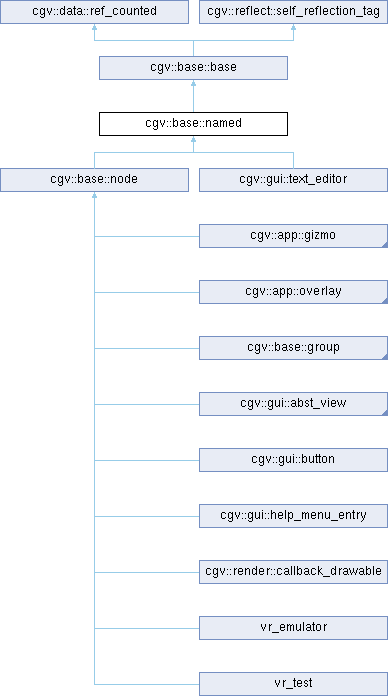|
| | named (const std::string &name="") |
| | construct from name
|
| |
| const std::string & | get_name () const |
| | return the parent node
|
| |
| void | set_name (const std::string &_name) |
| | set a new parent node
|
| |
| named_ptr | get_named () |
| | cast upward to named
|
| |
| const_named_ptr | get_named_const () |
| | cast upward to const named
|
| |
| std::string | get_type_name () const |
| | overload to return the type name of this object
|
| |
| virtual std::string | get_default_options () const |
| | overload to provide default options for registration
|
| |
| std::string | get_name_or_type_name () const |
| | determine name of instance by checking cgv::base::named interface and in failure fallback to get_type_name()
|
| |
| virtual void | on_register () |
| | overload to handle register events that is sent after the instance has been registered
|
| |
| virtual void | unregister () |
| | overload to handle unregistration of instances
|
| |
| virtual bool | on_exit_request () |
| | overload to handle the appication exit request, return true if exiting is allowed and false otherwise
|
| |
| virtual void | stream_stats (std::ostream &) |
| | overload to show the content of this object
|
| |
| virtual data::ref_ptr< node, true > | get_node () |
| | perform downcast to node
|
| |
| virtual data::ref_ptr< group, true > | get_group () |
| | perform downcast to group
|
| |
| virtual data::ref_ptr< const named, true > | get_named_const () const |
| | perform downcast to const named
|
| |
| virtual data::ref_ptr< const node, true > | get_node_const () const |
| | perform downcast to const node
|
| |
| virtual data::ref_ptr< const group, true > | get_group_const () const |
| | perform downcast to const group
|
| |
| template<class T > |
| data::ref_ptr< T, true > | cast () |
| | cast to arbitrary class, but use the casts to named, node and group from the interface
|
| |
| template<class T > |
| data::ref_ptr< const T, true > | cast_const () |
| | const cast to arbitrary class, but use the casts to named, node and group from the interface
|
| |
| template<class T > |
| T * | get_interface () |
| | use dynamic type cast to check for the given interface
|
| |
| template<class T > |
| const T * | get_const_interface () const |
| | use dynamic type cast to check for the given interface
|
| |
| virtual void | update () |
| | this virtual update allows for example to ask a view to update the viewed value. The default implementation is empty.
|
| |
| virtual void * | get_user_data () const |
| | this virtual method allows to pass application specific data for internal purposes
|
| |
| virtual bool | self_reflect (cgv::reflect::reflection_handler &) |
| | used for simple self reflection
|
| |
| virtual std::string | get_property_declarations () |
| | return a semicolon separated list of property declarations
|
| |
| virtual bool | set_void (const std::string &property, const std::string &value_type, const void *value_ptr) |
| | abstract interface for the setter of a dynamic property.
|
| |
| virtual void | on_set (void *member_ptr) |
| | this callback is called when the set_void method has changed a member and can be overloaded in derived class
|
| |
| virtual bool | get_void (const std::string &property, const std::string &value_type, void *value_ptr) |
| | abstract interface for the getter of a dynamic property.
|
| |
| virtual bool | call_void (const std::string &method, const std::vector< std::string > ¶m_value_types, const std::vector< const void * > ¶m_value_ptrs, const std::string &result_type="", void *result_value_ptr=0) |
| | abstract interface to call an action
|
| |
| void | set (const std::string &property, const char *value) |
| | specialization of set method to support const char* as strings
|
| |
| template<typename T > |
| void | set (const std::string &property, const T &value) |
| | set a property of the element to the given value and perform standard conversions if necessary.
|
| |
| template<typename T > |
| T | get (const std::string &property) |
| | query a property of the element and perform standard conversions if necessary.
|
| |
| void | multi_set (const std::string &property_assignments, bool report_error=true) |
| | set several properties
|
| |
| bool | is_property (const std::string &property_name, std::string *type_name=0) |
| | check if the given name specifies a property.
|
| |
| void * | find_member_ptr (const std::string &property_name, std::string *type_name=0) |
| | find a member pointer by name.
|
| |
| int | get_ref_count () const |
| | read access to current count
|
| |
base class for all gui types
Definition at line 19 of file named.h.

 Public Member Functions inherited from cgv::base::base
Public Member Functions inherited from cgv::base::base Public Member Functions inherited from cgv::data::ref_counted
Public Member Functions inherited from cgv::data::ref_counted Protected Member Functions inherited from cgv::base::base
Protected Member Functions inherited from cgv::base::base Protected Member Functions inherited from cgv::data::ref_counted
Protected Member Functions inherited from cgv::data::ref_counted Static Protected Member Functions inherited from cgv::base::base
Static Protected Member Functions inherited from cgv::base::base